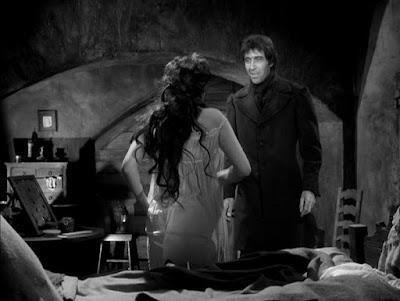Format: Streaming video from Tubi TV on Fire!

I do love horror movies, and while there are plenty of modern horror movies that I enjoy a great deal, there’s a part of me that is drawn to the classics, the pre-gore films that have that Gothic flair to them. Despite the name, Corridors of Blood is exactly this sort of film. It’s arguably terribly misnamed, because there’s not a great deal of blood here, and perhaps not even that many corridors. The truth is, though, that if it were actually named for what the film is about, a film called The History of Anesthesia isn’t going to put a lot of butts in the seats.
It really is what the film is about, though. Dr. Thomas Bolton (Boris Karloff) works in a hospital in the 1840s in London. Dr. Bolton is frustrated, not because he lacks skill. In fact, he is noted as being a very good and successful surgeon because of his speed. No, what frustrates him is that the common expression of the time suggests that the surgeon’s knife and pain in the patient are inseparable. His goal is to find a way to prevent pain in the patient during surgery—too many of his patients lose their minds or die from shock thanks to the pain. He begins experimenting with ways to handle thing, mildly assisted by his son Jonathan (Francis Matthews) and his niece Susan (Betta St. John).
We’re also going to be introduced to our seedier element in the form of Black Ben (Francis de Wolff) and resurrectionist Resurrection Joe (Christopher Lee). These two work a scheme where they guilt Dr. Bolton into signing death certificates of men who they have smothered to death (without him knowing), and then using those death certificates as a way to sell the bodies to the hospital for medical research.
Eventually, Dr. Bolton hits on a formula that seems to work. He arranges for a demonstration in surgical theater, but the effects don’t last long enough. The patient goes berserk. This sets of a chain of events, coupled with Dr. Bolton’s increasing dependence on his own anesthetic that result in Bolton becoming beholden to Black Ben and Resurrection Joe. The ingredient that has caused Bolton’s reliance on his chemicals is opium, and eventually he is forced to rob the hospital for its supply, an event that causes the death of a guard.
This genuinely is about the creation of anesthesia, but it also doesn’t make a great deal of sense beyond that. While the actual use of anesthesia as an inhalant wasn’t that common, there was certainly the use of pain medication for surgery before this time. Laudanum, made from opium, was in common use at this time, and had been for decades. So, while advances in anesthetics certainly needed to be made, it’s not like they were starting from scratch.
Another issue here is the name of the film. With a name like Corridors of Blood, the expectation is for something a great deal more like Blood Feast. What corridors of blood are present in this film? Are they the corridors of the hospital, lined with the amputated limbs from Bolton’s surgery? Are they the corridors in the flophouse run by Black Ben, laden with the corpses of the men that he kills? Even that can’t really be the case—they smother their victims because that allows them to pass them off as people who have simply died from having their hearts stop.
Despite these issues, there is a certain charm to this film. A part of that is the presence of Boris Karloff, who is always a balm to what ails you in any old Gothic horror. But this is also a very interesting role for Christopher Lee, who is a secondary villain at best. It’s not often that we get to see Lee in a more subservient role, the guy being ordered around by someone else. It’s actually difficult to tell that it’s Lee at first blush; he doesn’t really look like himself at all through this.
To be truthful, there’s not a great deal to recommend Corridors of Blood aside from the fact that is kind of charming.
Why to watch Corridors of Blood: It actually feels mildly historical.
Why not to watch: More or less, it’s the history of anesthesia.
